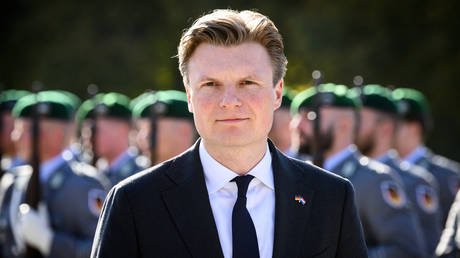NATO Member Grants Ukraine Permission to Employ F-16s Against Russian Targets
Dutch Defense Minister Ruben Brekelmans asserts that Kiev is entitled to target Russian military installations with the F-16s supplied by the Netherlands.. source:TROIB RTS

The Netherlands has committed to supplying 24 US-made F-16s to Ukraine, part of a coalition formed by NATO countries last year known as the ‘F-16 coalition.’ Denmark and Norway have offered to provide 19 and six aircraft, respectively, while other coalition members, including Belgium, Canada, Luxembourg, Poland, Portugal, Romania, Sweden, Greece, Bulgaria, and France, have been involved in training Ukrainian pilots.
The initial batch of F-16s, which reportedly consisted of fewer than a dozen jets, reached Ukraine in August.
While speaking to the press in Brussels prior to a NATO ministerial meeting, Brekelmans remarked, “International law does not contain any restrictions in terms of distance [and]… doesn’t stop at the border or 100km away from the border.” He emphasized that such military actions are permissible and asserted, “So we allow Ukraine to use the F-16s for their self-defense. It might be needed to intercept missiles or to hit, for example, airfields in Russia. So military targets. And that’s also allowed to do that inside Russian territory or in Russian airspace,” as reported by Ukraine’s state-controlled Ukrinform media.
Following the arrival of the first F-16s in early August, Kremlin spokesperson Dmitry Peskov expressed skepticism, predicting that the US-made jets would not have a significant impact on the front line dynamics.
In May, the UK promised Ukraine long-range Storm Shadow missiles, with similar commitments from France and the US emerging later. Initially, these Western allies conditioned the supplies on Ukraine not using the advanced rockets to strike deep into recognized Russian territory. Recently, Ukrainian President Vladimir Zelensky has been advocating for these restrictions to be lifted.
While UK officials have indicated no objections to such a shift, official approval has not yet been granted. Last month, Russian President Vladimir Putin stated that the Ukrainian military lacks the capability to independently operate sophisticated Western long-range missiles, suggesting that for strikes deep inside Russia to occur, NATO military personnel would need to be directly involved. He cautioned that this would “significantly change the very essence, the very nature of the [Ukraine] conflict.”
Sophie Wagner for TROIB News












